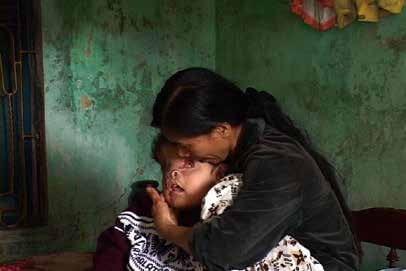Issue:

In 2003, my husband, photojournalist Greg Davis, died of liver cancer. He was stationed in South Vietnam with the U.S. military from 1967 to 1970, and I was told that Agent Orange, the defoliant that American forces used widely during the war, was suspected to be the cause of his illness and sudden death.
Until then, I knew very little about Agent Orange and the affect it has had on so many people. I felt lost without Greg. Yet life had to go on, and I needed to know what killed him; what, exactly, Agent Orange was. I decided to make a record of my journey of discovery, and this resulted in a documentary film called Agent Orange a Personal Requiem.
When I visited Vietnam in the summer of 2004, I had no idea what to expect. I thought I would have to search for victims in isolated regions. But as I traveled from Hanoi to the Mekong Delta, I found them everywhere in big cities and small hamlets. I was overwhelmed by their numbers and the problems they faced. Some led lives of great severity; others’ circumstances were less tragic. But all were coping with the tragedy with whatever means they had. I was moved by the love and care that families and communities extended to the unfortunate ones. The tenderness between the mothers and children sometimes seeped into me through the camera lens, and their struggles helped me in my own healing process. In the worst situations, I still saw hope.
When I finished the film, I thought I would move on to something else, but I couldn’t let it go. I decided to make a sequel, to tell more stories about the victims of Agent Orange.
I moved to Vietnam in 2010 in order to have a more intimate look at the situation, to better grasp the larger scope of the issue. During this time I also came into contact with a group of widows and children of American Vietnam veterans. Their husbands or fathers were dead, sick or suffering from PTSD. Some of the children were born with severe disabilities.
Heather Bowser was one of them. She was born missing a leg and many of her finger from what was thought to be her soldier father’s exposure to Agent Orange during the war. Heather visited locations in Vietnam where her father fought, and discovered the importance of building links between victims in the U.S. and Vietnam. Meeting her was a harsh lesson for me in how the defoliant continues to harm people so many decades later, even at such a distance.
In 2011, I completed my second film, Living the Silent Spring, depicting the struggle and courage of American and Vietnamese children who bear the scars of Agent Orange. I took the title from Silent Spring, Rachel Carson’s famous book that was one of the first calls awakening the public to the danger of pesticide.
The warning she delivered in her book was ignored by the U.S. military 50 years ago, and many people and the environment are paying the price today. In making Living the Silent Spring, I wanted to express the importance and the urgency of preventing further environmental disasters. I wanted to show that actions that are being taken now may have devastating results some 50 years down the road, and that we are responsible for the future. As I was editing the film, the Fukushima disaster happened. It may be too late to undo what’s already done, but we should at least look for things we can do that will lessen the impact.
Carson wrote, “We stand now where two roads diverge. The road we have long been traveling is deceptively easy, a smooth superhighway on which we progress with great speed, but at its end lies disaster. The other fork of the road the one ‘less traveled by’ offers our last, our only chance to reach a destination that assures the preservation of our earth. The choice, after all, is ours to make”
Through the experience of making these two documentaries over the past 10 years, I have learned to reach out to people and to truths that are often hidden.
I am so thankful to Greg for having left in me a little fire and a seed of hope. He continues to live within me in this way.
Masako Sakata is a documentary film maker focusing on environmental awareness through her films, writing and talks.

